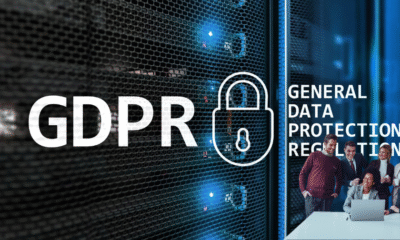Technology
Data Privacy and AML Compliance: Balancing Security with Customer Rights

It is a digital age, and AML procedures and digitalisation have become intricately intertwined. In today’s world, balancing data privacy and Anti-money Laundering (AML)compliance is a pertinent challenge for businesses today. While protecting customer data and upholding their data is important, complying with AML regulations to prevent financial crimes is also equally important. This is why a tactical balance needs to be struck between both measures. In fact, securing customer data is a compliance measure on its own.
Why is Securing Customer Data Important?
Customer data protection is important for a variety of reasons. Firstly, it respects customers’ privacy rights, showing consideration for their personal boundaries. Secondly, it builds trust, which is essential for customer loyalty and business success. Thirdly, it prevents unauthorised access to sensitive information, like financial and personal data. Additionally, legal regulations like GDPR and CCPA require data protection, and non-compliance can result in serious consequences.
Data security also guards against identity theft, sparing individuals from financial and emotional distress. Furthermore, protecting data preserves a company’s reputation, preventing customer loss and revenue decline. It also provides a competitive advantage, as customers prefer businesses that prioritise data security. Economically, data breaches can have far-reaching consequences. Plus, secure data enables effective analytics for better decision-making. It is the ethical duty of business organisations to protect customer data, reflecting responsible business practices.
The Pivotal Roles Customer Data Play In Compliance
Customer data plays a lot of pivotal roles in AML compliance procedures in the following ways;
1. For Customer Identification (KYC)
It is required of commercial entities in AML regulations to establish the identity of their customers through robust KYC procedures. This entails collecting and verifying customer data such as names, addresses, dates of birth, and identification numbers. This information is essential to ensure that the individuals or entities involved in financial transactions are legitimate and not involved in money laundering or other illicit activities.
2. In Customer Due Diligence
AML requirements require that customer transactions be monitored on an ongoing basis. Businesses must update and evaluate customer data on a regular basis in order to determine the risk associated with each customer. High-risk customers might require expanded due diligence, which entails gathering additional data to better understand their financial actions.
3. Collaboration and Data Sharing
As part of their AML activities, firms may be required to share customer data with law enforcement agencies, other financial institutions, or regulatory organisations in some situations. When sharing this information, it is critical to ensure data accuracy and privacy.
4. For Record Keeping
AML regulations require businesses to keep accurate and detailed records to facilitate auditing activities and other activities performed by regulatory oversights. These records include customer data and transaction histories. Of course, they may be for a specified period of time.
5. Suspicious Activity Reporting
When odd or suspicious transactions are discovered through customer data analysis, organisations must file Suspicious Activity Reports (SARs) with the proper regulatory authorities. These reports require accurate and well-documented client data.
6. Sanctions Screening
As part of AML compliance, customer data is checked against various sanctions and watchlists. This aids in the identification of persons or entities linked to terrorism, money laundering, or other illicit acts.
Ways To Ensure Security of Customer Data While Adhering to Compliance Regulations
Data Masking and Anonymization
Teams or personnel can use techniques like data masking or anonymisation to protect sensitive customer data when possible while still allowing for data analytics and testing. This will allow some data protection to some extent.
Conducting Due Diligence With Vendors
If third-party vendors are being used, entities should ensure that they are AML compliant and have robust security measures as well. Due diligence should be undertaken while selecting vendors to work or partner with.
Legal Counsel
The importance of legal counsel should not be overlooked. Executives can consult with legal specialists who specialise in data privacy and compliance to ensure that their practises are in accordance with current rules and that they are navigating difficult legal requirements.
Data Encryption
Entities should adopt robust encryption mechanisms, both in transit and at rest, to avoid unauthorised access to client data. Encryption ensures that data, even if intercepted or stolen, remains unreadable in the absence of the encryption keys.
Customer Consent
Before collecting and processing data from customers, officers should collect customers’ clear and informed consent. Make sure customers understand how their data will be utilised.
Employee Training
Another rational measure is to educate employees on data security best practices and industry-specific compliance standards. They should understand the significance of client data security.
Regular Audits and Assessments
Regular audits and assessments should take place to identify vulnerabilities and weaknesses in your data handling processes. These assessments help in maintaining compliance and improving security measures.
Data Retention Policies
Clear data retention policies should be established, outlining how long customer data will be maintained and when it should be safely disposed of when no longer required.
Data Minimization
Only necessary data should be collected for business purposes and regulatory compliance. Collecting excessive information that could increase security risks should be avoided.
Documentation and Records
Concerned staff should keep meticulous records of all data handling processes, security measures, and compliance initiatives. This documentation can be extremely useful during regulatory audits.
Bottom Line
In today’s complex business context, the delicate balance between data privacy and AML compliance is a dilemma for most innovative businesses today, as well as financial entities.
As technology advances and rules evolve, organisations must be watchful, proactive, and responsive. Businesses can not only safeguard their consumers but also improve trust, stimulate innovation, and create a more secure and resilient financial environment for all by implementing robust data security measures, protecting client privacy, and following compliance rules. Pursuing this balance between security and rights is not only a requirement of regulatory bodies but also an ethical obligation.
-

 Stock Market7 days ago
Stock Market7 days agoUS-China Tariff Agreement Fuels Stock Market Rally
-

 Stock Market6 days ago
Stock Market6 days agoUS-China Tariff Cuts Ignite Stock Market Surge
-

 Civil Rights7 days ago
Civil Rights7 days agoConstitutional Crisis: Outrage Over Proposed Elimination of Habeas Corpus
-

 Cybersecurity2 days ago
Cybersecurity2 days agoIs Your Privacy at Risk? What You Need to Know About New Data Regulations in 2025
-

 Stock Market5 days ago
Stock Market5 days agoUS Stock Market Soars as Tariff Cuts Signal Trade War Thaw
-

 Business5 days ago
Business5 days agoTrump’s Middle East Tour: Economic Gains and Diplomatic Challenges
-

 Finance4 days ago
Finance4 days agoUS Credit Rating Takes a Hit: Moody’s Downgrades to Aa1 Amid Debt Concerns
-

 Politics6 days ago
Politics6 days agoSupreme Court Weighs In On Trump’s Birthright Citizenship Challenge

















